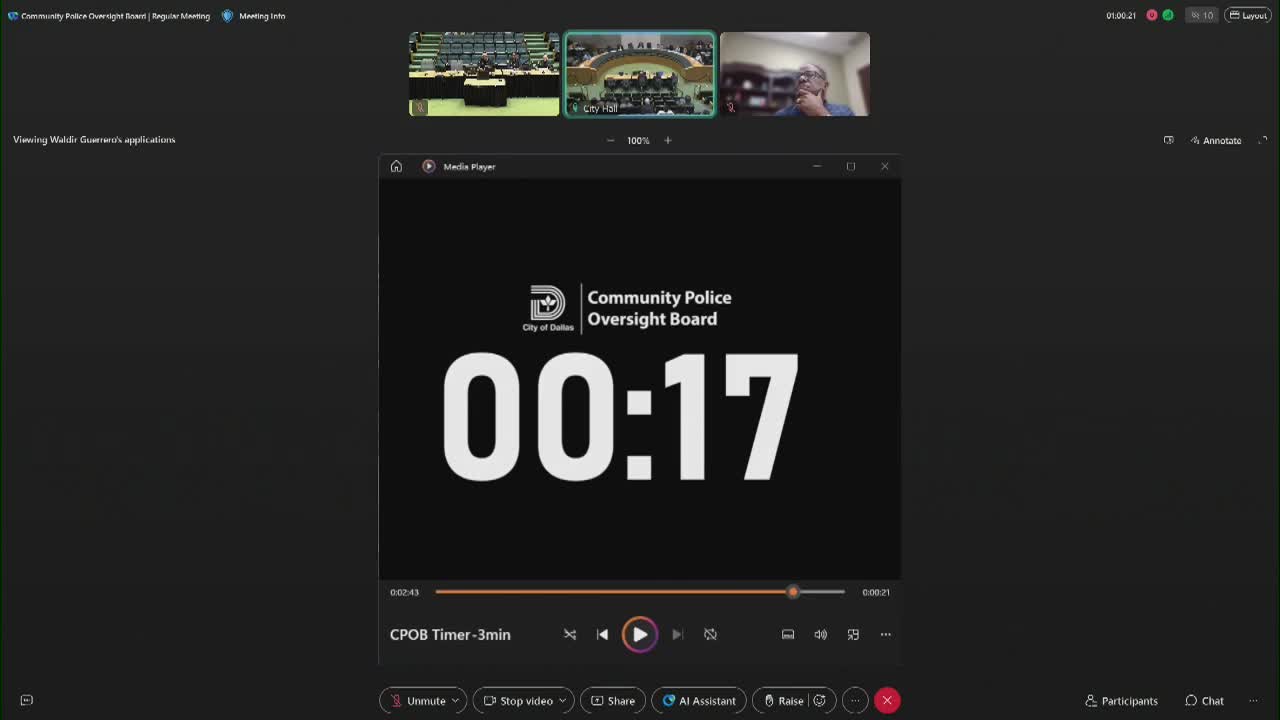Dallas police chief tells oversight board DPD has not aided ICE arrests, outlines hiring gains, drones and camera use
Get AI-powered insights, summaries, and transcripts
Subscribe
Summary
Chief Daniel Como told the Community Police Oversight Board that Dallas Police Department has not conducted immigration arrests on behalf of ICE, described recent recruiting gains toward a voter‑approved staffing goal, and defended drone and Flock Safety camera use while agreeing to share policy documents with the board.
Chief Daniel Como told the Community Police Oversight Board on Wednesday that the Dallas Police Department had not been assisting ICE in making immigration arrests inside the city and said he personally refused an offer tied to the 287(g) program.
"We were offered $25,000,000 to be a part of 2 87 gs. And we said absolutely no," Chief Como said, adding that his department has "had very little interactions with ICE" and that he had declined participation.
Board members pressed the chief about recent videos and public reports showing masked individuals identifying as police during arrests. Como said footage shown to the board included operations that were federal human‑trafficking investigations for which DPD provided perimeter security, and not immigration sweeps that required DPD to make immigration arrests.
The chief also addressed staffing and recruitment tied to a voter‑approved "HERO" amendment that requires a minimum department size. "Currently, we're at, really close to 2,300," Como said, and he reported the department exceeded a short‑term hiring target by recruiting more than 325 officers. The October‑era academy class he described as the department's second‑largest and notably diverse: "It also had the second largest amount of women in the academy class ... which was 20," he said. He added the department was on pace to exceed a goal of hiring 350 officers in the upcoming fiscal year.
On surveillance technology, Deputy Chief Monique Alex and Chief Como described drone and license‑plate camera (Flock Safety) policies and uses. The department's officials told the board the drones operate under Federal Aviation Administration rules and state guidance, and that Dallas policy restricts drone deployment for felony search warrants, protests, large events and other enumerated scenarios. "There's a drone policy that lists when we can and when we cannot use drones," the executive assistant chief said.
Regarding Flock Safety license‑plate readers, Como and his staff said the system is license‑plate only (no facial recognition) and credited the cameras with helping locate suspects in violent crimes. "Without the flight cameras, they would not be in custody right now," Como said of one recent homicide investigation. He also told the board that outside agencies cannot access camera data without requesting it and that DPD will look up plate data for partner agencies if a federal partner provides a warrant.
Chief Como told the board he supports keeping neighborhood policing officers (MPOs) in place and said the department will continue community outreach, crime‑prevention education and traffic enforcement targeted per council requests. He also said the department is planning to hire civilian investigators for the internal affairs unit to increase independence in misconduct investigations.
Why this matters: The board's role is oversight; chief's answers and the department's expressed willingness to share policies and data are the first step toward board review and possible recommendations. The chief's public refusal of federal 287(g) participation and the department's stated limits on data sharing are likely to be of interest to immigrant communities and transparency advocates.
Board follow-up: Board members asked for copies of the drone policy and a summary of Flock Safety data‑access rules; OCPO staff noted they will request the documents. The board also pressed the chief to keep federal collaborations to a minimum and to document any interactions.
Ending: The chief agreed to return for additional meetings and to provide requested policies and clarifications to the board.
